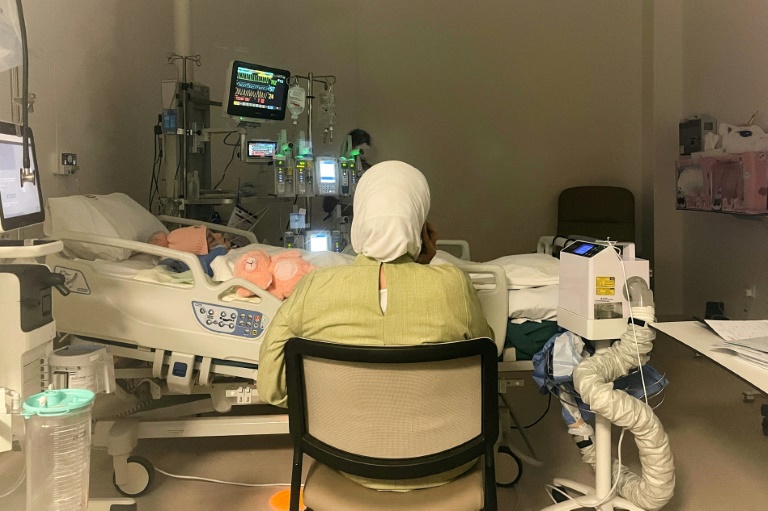Syria child quake victims, flown to UAE, unaware of heartbreak to come

Sham Sheikh Mohammed, a 9-year-old Syrian earthquake survivor, receives treatment at a hospital in Abu Dhabi unaware that her mother and sister died in the February quake
Abu Dhabi – Cradling a pink stuffed animal as she sleeps in a United Arab Emirates hospital, a nine-year-old Syrian earthquake survivor is recovering from the wounds that nearly claimed her life, believing her mother is still alive.
Sham Sheikh Mohammed, who suffered severe crush injuries in a 40-hour ordeal under the rubble, has not yet been told that both her mother and sister died in the February 6 earthquake that killed more than 50,000 people in Syria and Turkey.
“I tell her that her mother is in critical care and that her condition is difficult,” said her father, Mohammad, who has barely slept since Sham and his 15-year-old son, Omar, were taken from Syria’s rebel-held northwest to Turkey and then flown to Abu Dhabi for emergency medical treatment.
Sham’s story captivated Syrians and others around the world after a viral video showed her humming a tune with the White Helmets rescue group that worked for six hours to free her.
She and her brother are among 12 Syrian quake survivors who were flown by the UAE for specialist care for their crush injuries in Abu Dhabi.
Doctors at the Burjeel Medical City hospital say they have “controlled” life-threatening infections in her lower limbs, without commenting on whether they were forced to amputate.
“Sham’s condition is stable,” said her father, also declining to give further details.
Sham’s survival encapsulated the tragedy, hope and heartbreak of the 7.8-magnitude quake that levelled buildings across Turkey and parts of Syria last month.
After her rescue in the town of Armanaz, in Idlib province, captured global attention, the UAE dispatched a medical aircraft to fly her and Omar to Abu Dhabi from Istanbul.
“Both children are now recovering well,” their doctor in Abu Dhabi, Michael Uglow, said in a statement last week.
But Sham is not the only young survivor who will soon face a harrowing revelation.
– ‘We told her everyone’s alive’ –
In a nearby hospital, Israa al-Abdullah receives routine updates on her medical condition but no news on the fate of her family.
Like Sham, the 17-year-old from the Syrian government stronghold of Jableh was rescued after spending hours trapped in rubble.
She has injuries to her skull, pelvis and shoulder and nerve damage in her eyes, said her brother Mohammad, a Syrian army soldier who was in Damascus when the quake hit.
What Israa doesn’t know is that her parents and four other siblings all died in the earthquake, along with a brother’s wife and daughter.
Israa, her 12-year-old sister and one nephew were the only survivors.
“We told her that everyone is alive,” said Mohammad, closing the door of Israa’s hospital room so she couldn’t overhear.
Israa asks most about her mother, her sister Ghufran as well as her young niece Jana — all of whom were killed, Mohammad said.
“I tell her I don’t have phone credit in the UAE” when she asks to speak to them, he told AFP at the Sheikh Shakhbout Medical City hospital.
– ‘My son died hungry’ –
Hooked to monitors and an intravenous drip, Israa pants heavily but can barely speak. The nerve damage has left her cross-eyed and suffering from impaired vision.
Doctors say she will likely make a full recovery, according to Mohammad. But until she improves, the truth about her family will remain a secret.
“I buried my family members one after the other,” Mohammad said. “I can’t tell (Israa) anything until God cures her and she can get up on her own two feet.”
In a nearby room, Ali Yussef Remmo, a displaced Syrian from the countryside of Latakia province, is receiving treatment for injuries in his lower limbs.
The father of three has regained partial leg mobility and is confident that he will walk again. But he is plagued by the loss of his youngest son and his wife, who was two months pregnant when their building collapsed.
The hardest part of being in an Emirati hospital, he said, is receiving platefuls of food, knowing he couldn’t afford dinner for his family the day the tremor took their lives.
“My son died hungry,” he said, tears swelling in his eyes.
“When I come to eat chicken, or meat, or an apple or a biscuit, I think that my 10-year-old was deprived of all of these things.”
